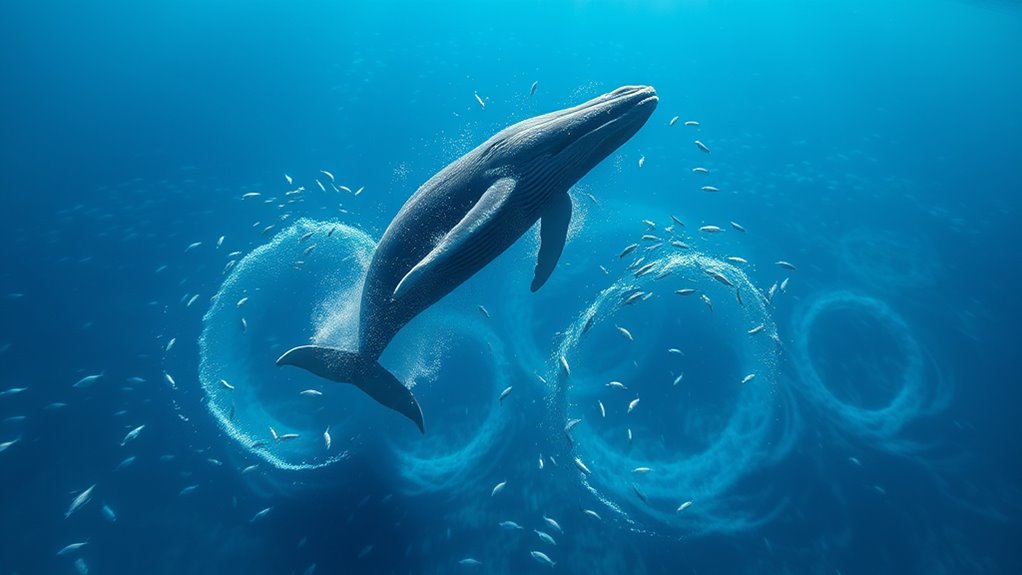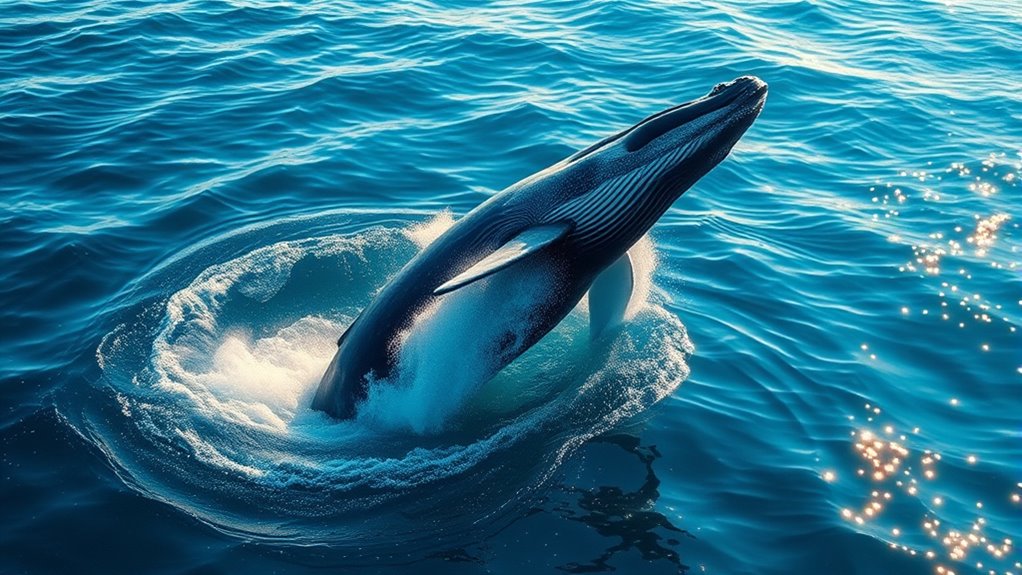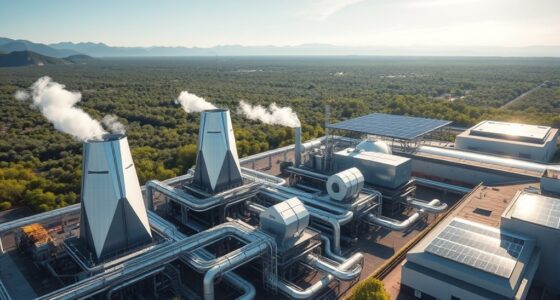Whales help fight climate change by fertilizing oceans, which boosts the growth of tiny plants called phytoplankton. When whales dive deep and come up to the surface to breathe and defecate, they transfer nutrients that fuel phytoplankton’s growth. These plants absorb carbon dioxide from the atmosphere and store it in the ocean. Supporting whale populations strengthens this natural process, making the ocean a more powerful climate ally—if you wanna know how, keep exploring this fascinating connection.
Key Takeaways
- Whales transfer nutrients from deep waters to surface layers through their feeding and defecation activities.
- These nutrients boost phytoplankton growth, which forms the base of the marine food web.
- Increased phytoplankton absorb more CO₂ during photosynthesis, aiding in carbon sequestration.
- Healthy phytoplankton populations help reduce greenhouse gases and mitigate climate change.
- Whale conservation supports ocean health, enhancing natural climate regulation and carbon capture processes.

While it might seem surprising, whales play an essential role in fighting climate change. One of the key ways they do this is through their impact on marine nutrient cycling, a process crucial for maintaining healthy ocean ecosystems. When whales feed in the deep ocean and then surface to breathe and defecate, they transfer nutrients from the depths to the surface waters. This movement acts like a fertilizer, enriching the nutrients available for phytoplankton—the tiny plants that form the base of the marine food web. Phytoplankton absorb carbon dioxide during photosynthesis, meaning that healthier, more abundant phytoplankton populations can sequester more carbon from the atmosphere. This natural process helps reduce greenhouse gases and mitigates climate change effects. Additionally, supporting ocean health through whale conservation can have far-reaching benefits for global climate resilience.
Frequently Asked Questions
How Do Whale Populations Affect Global Carbon Cycles?
You might not realize it, but whale populations play a crucial role in global carbon cycles. Through whale migration, they move nutrients across vast ocean regions, supporting marine food webs. When whales feed and defecate at different depths, they fertilize the oceans with essential nutrients like nitrogen and iron. This process boosts phytoplankton growth, which absorbs CO2, helping to regulate climate. So, healthy whale populations help keep carbon in check.
What Specific Nutrients Do Whales Release That Benefit Plankton Growth?
You’re curious about the specific nutrients whales release to boost plankton growth. When whales excrete, they release essential nutrients like nitrogen, iron, and phosphorus into the water. These nutrients act as fertilizers, promoting plankton growth, which in turn helps absorb more carbon dioxide from the atmosphere. By supporting healthy plankton populations, whales play a fundamental role in the ocean’s ability to regulate climate and maintain ecological balance.
Are Certain Whale Species More Effective at Fertilizing Oceans?
You might wonder if some whale species are better at fertilizing oceans. The truth is, species with different feeding habits and migration routes impact fertilization differently. For instance, baleen whales feed on plankton and travel vast distances, releasing nutrients as they migrate. Their feeding habits and extensive routes help distribute nutrients more widely, making them more effective at promoting plankton growth and supporting ocean health overall.
How Does Whale Decline Impact Oceanic Carbon Absorption?
Imagine your garden wilting without bees; similarly, whale declines hurt ocean health. When whale populations drop, their migration patterns change or disappear, reducing nutrient cycling. The impact of whale hunting has already decreased whale numbers, lessening their role in fertilizing oceans. This decline means less carbon absorption, making climate change worse. Protecting whales guarantees they continue supporting healthy, absorbing oceans for our planet’s future.
Can Whale Conservation Directly Influence Climate Change Mitigation?
You might wonder if conserving whales can directly help fight climate change. The answer is yes—by protecting whales, you support their migration patterns and whale vocalizations, which are essential for maintaining healthy ocean ecosystems. These behaviors help whales fertilize the ocean through nutrient cycling, boosting carbon absorption. Your efforts in whale conservation can enhance these natural processes, ultimately contributing to climate change mitigation by promoting more robust, carbon-absorbing oceans.
Conclusion
You might think whales’ impact is small, but their role in fertilizing oceans is essential for climate stability. By releasing nutrients that boost plankton growth, they help sequester carbon naturally. While some worry about relying on marine life for climate solutions, integrating whale conservation with broader efforts can enhance overall effectiveness. Embracing this natural process isn’t just eco-friendly—it’s a smart, sustainable way to fight climate change, proving that even the largest creatures can make a big difference.









